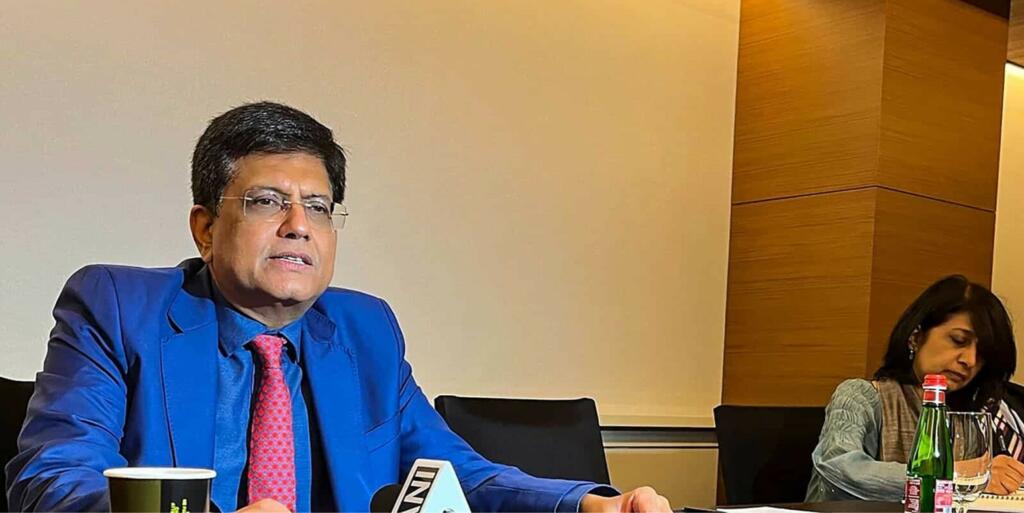In international relations, neither there is any permanent friend nor any permanent interest. The only thing that is permanent is national interest. It brings nations together, creates alliances and forms organisations. According to its people’s interest, countries are involved in the construction or deconstruction of some regional, international or multilateral organisations. Similarly, according to the interest of Indians, the government is also engaging with various organisations. Further, with the economic and political stability, India’s voice in the world has not only become assertive but also independent.
Piyush Goyal’s Masterstroke in IPEF
Growing with its assertive and independent stance in the world, India has once again taken a very strategic decision in the US led Indo-Pacific Economic Framework (IPEF). Reports suggest that India has opted out of the joint declaration on the trade pillar of the IPEF ministerial meet in Los Angeles (USA). Citing concerns over possible discrimination against developing economies, India has decided not to become one of the four key pillars of IPEF.
While talking to media about the decision, Piyush Goyal, the Minister of Commerce of Industry, said that the trade pillar had many discrimination clauses against countries like India. The concerns include – worries over digital trade, linkage of environment, labour to trade, binding commitments, benefits that accrue and responsibilities of the developed world.
Why India opted out of trade pillar of IPEF: Indian Trade Minister Goyal lists
-Worries over digital trade
-Linkage of environment & labour to trade
-Binding commitments
-Benefits that accrue
-Responsibilities of developed world https://t.co/q4nSp0K0Xo pic.twitter.com/yF42lKDy2J— Sidhant Sibal (@sidhant) September 10, 2022
The Minister of Commerce of Industry explaining the decision said, “We have to see what benefits member countries will derive and whether any conditionalities on aspects like environment may discriminate against developing countries, who have the imperative to provide low cost and affordable energy to meet the needs of our growing economy.”
However, India joined the other three Pillars – Supply Chains, Clean Economy and Fair Economy. In the statement, India said that we had engaged exhaustively on all four pillars, and was comfortable with the outcome statements on the other three pillars.
Indo-Pacific Economic Framework
IPEF is a comprehensive economic partnership with Indo-Pacific countries to counter the debt trap diplomacy of China in the region. The plan is to create a transparent, diversified, secure and sustainable supply chain to make them more resilient and integrated in the region.
Announcing the economic pact of the Indo-Pacific region for economic prosperity, in its press release the group stated that “We, the United States, Australia, Brunei Darussalam, India, Indonesia, Japan, Republic of Korea, Malaysia, New Zealand, Philippines, Singapore, Thailand and Vietnam of the Indo-Pacific region, acknowledge the richness and the diversity of our vibrant regional economy”.
Declaring the goal of the IPEF (Indo-Pacific Economic Framework), the statement read that ‘we share a commitment to a free, open, fair, inclusive, interconnected, resilient, secure, and prosperous Indo-Pacific region that has the potential to achieve sustainable and inclusive economic growth. We acknowledge our economic policy interests in the region are intertwined, and deepening economic engagement among partners is crucial for continued growth, peace, and prosperity”.
Piyush Goyal repeats his RCEP Masterstroke
Despite aligning fully with the goal of IPEF, India chose to stay out of the one of the key pillars which is trade. The independent and assertive decision of the government mirrors its earlier decision. When in a similar type of trade pact, RCEP, which included China but not the US, India chose to opt-out.
Regional Comprehensive Economic Partnership (RCEP) is a free trade agreement (FTA) that envisages creating the world’s largest economic coalition in the Indo-Pacific. But, citing a similar kind of trade discrimination, India chose to opt-out from the groupings.
The reason involved was unfavourable balance of trade, dumping of Chinese goods, non-acceptance of auto-trigger mechanism, protection of domestic industries and lack of consensus on rules of origin. While talking about India’ ‘clear-eyed calculation’ of the gains and loss after joining RCEP, S Jaishankar had said, “no agreement at this time was better than a bad agreement”.
The decision to not join the RCEP was very much favourable in India. Due to the involvement of China, it was very much possible to take benefit of early market expansion. China could have dumped its products in the Indian market and the domestic industries would have struggled in front of low-cost substandard Chinese products. Without getting much protection, India’s mass market would have gone in the hands of the Chinese. An informed and calculated decision to not join the groups proved beneficial for India.
When we look three years down the line and see the crumpling Chinese economy and tension in the region, it was a masterstroke of Piyush Goyal to not let India join China led RCEP. Similarly, the wise decision to optout of the ‘trade pillars’ of IPEF concerning similar reservations as was in RCEP, India seemed to stand firm on its ground. Despite a common goal to counter China, India chose what was best for its people and economy.
Support TFI:
Support us to strengthen the ‘Right’ ideology of cultural nationalism by purchasing the best quality garments from TFI-STORE.COM
